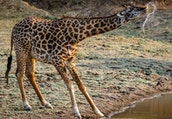- Appearance: The Black Rhinoceros is smaller than the White Rhinoceros and has a pointed upper lip, allowing it to feed on leaves and shrubs. Its name "Black" may be a misinterpretation of the word "Browsing," referring to its feeding behavior.
- Population: There are several subspecies of Black Rhinoceros, with varying population numbers. Some subspecies are critically endangered.
- Habitat: Black Rhinos are found in a wider range of habitats, including savannas, forests, and shrublands, across Southern and Eastern Africa.
- Conservation Status: The Black Rhinoceros is classified as "Critically Endangered" by the IUCN, mainly due to poaching for their horns.
- Appearance: The White Rhinoceros is the larger of the two African rhino species and has a wide mouth, suitable for grazing on grass. Its name "White" is believed to be a mistranslation of the Dutch word "wijde," meaning wide, referring to its broad mouth.
- Population: There are two subspecies of White Rhinoceros: the Southern White Rhinoceros, which is the most numerous, and the critically endangered Northern White Rhinoceros, with only a few individuals remaining.
- Habitat: White Rhinos are found primarily in grasslands and savannas of Southern Africa, including countries like South Africa, Namibia, Zimbabwe, and Kenya.
- Conservation Status: The Southern White Rhinoceros is classified as "Near Threatened" by the International Union for Conservation of Nature (IUCN), while the Northern White Rhinoceros is considered "Critically Endangered."
- 3. Africa Both Black and White Rhinoceros populations have declined significantly over the years due to poaching for their highly valued horns, which are falsely believed to have medicinal properties in some cultures. Conservation efforts, including anti-poaching measures and habitat protection, are ongoing to protect these magnificent creatures from extinction.
Africa Rhinoceros
Africa is home to two species of rhinoceros: the Black Rhinoceros (Diceros bicornis) and the White Rhinoceros (Ceratotherium simum) Rhinoceroses are iconic and endangered animals, known for their large size and distinctive horn. When planning your Africa Rhinoceros safari tour, choose reputable safari operators and lodges that are committed to responsible tourism and support rhino conservation efforts. Your safari adventure will not only provide unforgettable memories but also contribute to the preservation of these iconic African species.
Africa Safari Tour Book online The Okapi safari
Here is some information about African rhinoceroses:
1. African Black Rhinoceros (Diceros bicornis):
2. White Rhinoceros (Ceratotherium simum):
Africa Rhinoceros Safari Tour
An "Africa Rhinoceros Safari Tour" is not a typical or common safari tour that is offered to tourists. Unlike other wildlife safaris that focus on observing and experiencing Africa's iconic mammals, birds, and other wildlife in their natural habitats, a safari tour specifically centered around pythons is not a standard part of safari itineraries.
By planning ahead and choosing reputable safari operators or guides, Spotting rhinoceros in the wild is a rare and humbling experience. It allows you to connect with these incredible animals and raises awareness about the urgent need for their conservation.
Africa Rhinoceros Safari Destinations
Safari Destinations: Rhinoceros can be found in various game reserves and national parks in Southern and Eastern Africa. Some popular safari destinations where you may have a chance to spot rhinoceros include:
- South Africa: Kruger National Park, Hluhluwe-Imfolozi Park, Pilanesberg National Park, and private game reserves in the Eastern Cape and North West provinces.
- Namibia: Etosha National Park and private reserves.
- Zimbabwe: Hwange National Park and private conservancies.
- Kenya: Lewa Wildlife Conservancy, Ol Pejeta Conservancy, and Maasai Mara National Reserve.
Africa Rhinoceros Guided Game Drives
Guided Game Drives: Participate in guided game drives led by experienced safari guides. Game drives offer excellent opportunities to spot rhinoceros and other wildlife during their most active times of the day.
Africa Rhinoceros Wildlife Diversity
Wildlife Diversity: While on your rhinoceros safari, you will likely encounter a diverse range of other African wildlife, such as elephants, lions, giraffes, zebras, and various bird species.
Africa Rhino Conservation:
Rhino Conservation: Many safari operators and reserves prioritize rhino conservation efforts. You may have the chance to learn about conservation initiatives aimed at protecting these endangered animals.
Africa Rhino Conservation Fees
Conservation Fees: Keep in mind that some reserves charge conservation fees or additional costs to support rhino conservation efforts. These fees contribute to the protection of wildlife and their habitats.
Africa Responsible Wildlife Viewing
Responsible Wildlife Viewing: Always prioritize the safety and well-being of the animals during your safari. Observe rhinoceros from a safe distance and follow the guidance of your safari guide to minimize any disturbance to the wildlife.
Africa Rhinoceros Photography Opportunities
Photography Opportunities: Bring a camera with a zoom lens to capture ostrich sightings and other wildlife encounters. A pair of binoculars will also be useful for better wildlife viewing.
Africa Rhino Tracking
Rhino Tracking: Some safari lodges offer specialized rhino tracking experiences, where expert guides help you track and locate rhinoceros in their natural habitat.
Africa Rhino Patience and Timing
Patience and Timing: Rhino sightings are not guaranteed, as they are wild animals and can be elusive. Patience and timing are essential for successful wildlife viewing during any safari.








 |
|  |
|  |
|  |
| 